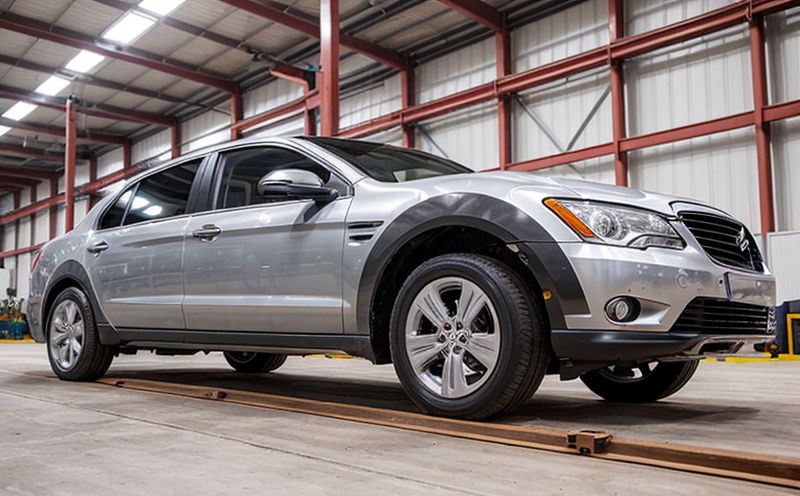EN ISO 14341 Welding Filler Metal Integrity Testing
The EN ISO 14341 standard provides a comprehensive framework for ensuring the integrity of welding filler metals used in industrial manufacturing processes. This test is critical for guaranteeing that welds are not only structurally sound but also chemically and metallurgically compatible with the base materials they join.
The process involves several key steps to ensure accuracy and reliability. Specimens are typically prepared by removing a segment of the filler metal from the welded joint, which is then subjected to various mechanical tests designed to assess its tensile strength, ductility, and resistance to fracture under dynamic loading conditions. These tests are intended to replicate real-world stress scenarios that welding filler metals may encounter during use.
The testing procedure outlined in EN ISO 14341 involves the following steps:
- Sample preparation: The specimen is extracted from the welded joint and machined into a standard form suitable for tensile testing.
- Tensile testing: The prepared sample undergoes tensile loading until failure. This allows for the determination of yield strength, ultimate tensile strength (UTS), elongation at break, and reduction in area.
- Metallurgical evaluation: Following mechanical testing, a detailed metallurgical examination is conducted to assess grain structure, inclusion content, and other microstructural features that could influence filler metal integrity.
The results of these tests are compared against the specified requirements outlined in EN ISO 14341. Compliance with these standards ensures that the welding filler metals not only meet performance expectations but also adhere to international best practices for quality assurance and safety.
This testing method is particularly important in sectors such as aerospace, automotive, construction, and energy where the integrity of welded structures can have significant implications for operational safety and reliability. By adhering to EN ISO 14341, manufacturers can ensure that their products meet stringent quality benchmarks and are fit for purpose.
Why It Matters
The mechanical and structural integrity of welding filler metals is paramount in ensuring the longevity and safety of critical industrial components. Poorly manufactured or improperly selected filler metals can lead to premature failure, costly repairs, and even catastrophic failures that put lives at risk.
- Increased Safety: Ensuring filler metal integrity minimizes the risk of accidents caused by structural failures in high-stress environments.
- Cost Efficiency: By preventing early failures, manufacturers can reduce maintenance costs and extend the operational life of their products.
- Regulatory Compliance: Adherence to international standards like EN ISO 14341 is essential for maintaining compliance with regulatory requirements and avoiding penalties or recalls.
The importance of this testing cannot be overstated, especially in industries where the quality of welded joints directly affects public safety. For example, in the aerospace industry, any compromise in filler metal integrity could lead to catastrophic failures, while in automotive manufacturing, it can result in vehicle damage and potential injury.
By implementing rigorous testing protocols such as those outlined in EN ISO 14341, manufacturers can instill confidence in their products' reliability and durability. This not only enhances brand reputation but also fosters trust among clients and regulatory bodies.
Eurolab Advantages
At Eurolab, we pride ourselves on delivering exceptional service with a focus on accuracy, precision, and reliability. Our expertise in mechanical and structural integrity testing is complemented by state-of-the-art facilities and experienced technicians who are fully trained to conduct EN ISO 14341 welding filler metal integrity tests.
- Accurate Testing: Utilizing the latest instrumentation and equipment, our laboratory ensures that every test adheres to strict international standards.
- Comprehensive Reporting: Our detailed reports provide not only numerical results but also insights into potential areas for improvement in filler metal composition or manufacturing processes.
- Timely Delivery: We understand the importance of timely testing and reporting, which is why we strive to meet your deadlines without compromising on quality.
- Expertise and Experience: Our team of experts has extensive experience in conducting various types of mechanical tests, allowing us to provide tailored solutions that meet your specific needs.
We also offer a range of additional services such as metallurgical analysis, fracture toughness testing, and residual stress measurement, which can be integrated into our EN ISO 14341 testing process. This allows for a more comprehensive evaluation of filler metal integrity, providing you with a holistic understanding of the materials' performance.
Partnering with Eurolab ensures that your welding filler metals are subjected to rigorous scrutiny, giving you peace of mind knowing that they meet the highest standards of quality and reliability.
Competitive Advantage and Market Impact
- Differentiation in Quality: By adhering strictly to EN ISO 14341, your products stand out from competitors who may not meet the same rigorous standards.
- Enhanced Reputation: A commitment to quality and compliance enhances your brand's reputation, making it a preferred choice for discerning clients.
- Better Customer Trust: Demonstrating adherence to international standards builds trust with customers, leading to long-term relationships and repeat business.
- Simplified Regulatory Compliance: By ensuring that all testing is conducted in accordance with EN ISO 14341, you simplify the process of meeting regulatory requirements.
The demand for high-quality filler metals continues to grow as industries increasingly prioritize safety and reliability. By leveraging Eurolab's expertise in this area, you can gain a competitive edge in your market. Our services not only meet current standards but also anticipate future trends, ensuring that you remain ahead of the curve.





